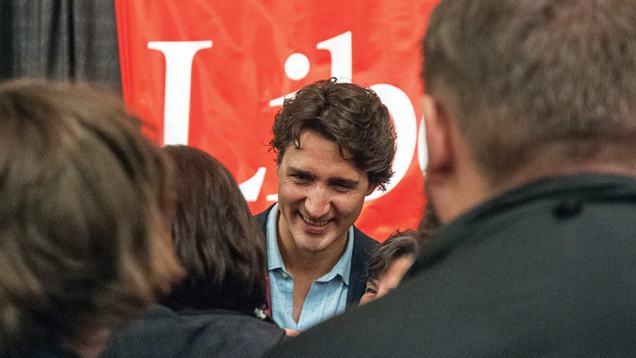Rumours of Grace: Politics, western Christianity and Justin Trudeau's new job
 CREDIT: SEAN BRADY / THE OMEGA
CREDIT: SEAN BRADY / THE OMEGAJustin Trudeau, son of the late Pierre Trudeau, speaks, as nearly all Canadian political leaders do, with a sense that government must promote not only order, but also justice.
There are many questions that we could ask of political leaders. With a federal election in our rear view mirrors, many questions are being asked of them. They are being asked to increase childcare benefits, to rethink foreign policy or for a new approach to environmental issues, to the economy, education and health care.
But what is the main job of government, of our political leaders?
Increasingly in our globalized world the answer seems to be to manage the economy. It’s not their only job, but it’s the main one.
And by managing the economy we usually mean controlling the flow of capital and creating jobs in such a way that we all get a little wealthier with each passing year.
The feeling we have is that if the economy is strong, everything else will be just fine. If there is enough money and resources to go around, we will be able to purchase, train, hire, develop or spend our way out of any difficulties.
Of course, it is helpful to have enough money and resources to meet the needs of society. But is it the main job of political leaders to deliver to us a sound modern economy with bottom lines that are in the black?
In our part of the world, religion has helped provide a hopeful framework for thinking about the role of those who govern. By religion, I mean the western religious tradition of Christianity.
Other religions have vastly different ways of approaching the relationship between themselves and the political order. For example, Saudi Arabia, an Islamic state, has its constitution based on the teachings of the Quran. That relationship between religion and politics may look good to some living in the Islamic world, but almost anywhere else it would be seen as strange, and more likely, disastrous.
The Christianity of the western world provides two foundational concepts with regard to the role of political leaders.
First, leaders are to give order to society. Chaos, if it were our main goal as a society, would lead to very high levels of human suffering. Consider Libya and Iraq; we ousted their leaders in the name of whatever and now those countries have spiralled down into chaos.
These are things that so-called anarchists do not take seriously enough, but for centuries it has been the Catholic philosophers who have emphasized the establishment of order as a key goal for government.
The second foundational concept derived from western Christianity comes more from the Protestant branch of Christianity.
This concept is that the structures of society must promote justice. Thus, a healthy bottom line for the economy is meaningless when taken by itself. An example of this is the economy in Nazi Germany, which was healthy until the war got out of hand.
The Protestant branch of Christianity grew out of the Catholic branch in the 1500s. One of the complaints that Protestant leaders had about Catholicism at that time was that the latter did not do enough to promote justice for the poor.
The protesting leaders claimed that God required government officials to strive to not merely make their people wealthier, but to also work for an order that was just, especially for the disadvantaged.
The call for order is not exclusive to the Catholic tradition, nor is the requirement of just structures unique to the Protestants. The late non-Protestant Pierre Trudeau, trained in the Catholic (Jesuit) tradition, was able to speak of Canada’s goal to be a “just society”.
Hopefully, the political vision that grew out of western Christianity will continue to have its influence in Canadian political life. Perhaps we are seeing hints that this will be the case.
Justin Trudeau, son of the late Pierre Trudeau, speaks, as nearly all Canadian political leaders do, with a sense that government must promote not only order, but also justice.
I think that many of us feel that Stephen Harper gave us plenty of the former, but not enough of the latter. But perhaps we will see in the next four years a federal government that is more sympathetic to First Nations, refugees, the poor within Canada’s borders, those working hard to address global warming, seniors and those in the care of doctors.
We are a very orderly society and a kinder, gentler political hand, along with a more just voice from Ottawa, could do us all a lot of good.
Editorial opinions or comments expressed in this online edition of Interrobang newspaper reflect the views of the writer and are not those of the Interrobang or the Fanshawe Student Union. The Interrobang is published weekly by the Fanshawe Student Union at 1001 Fanshawe College Blvd., P.O. Box 7005, London, Ontario, N5Y 5R6 and distributed through the Fanshawe College community. Letters to the editor are welcome. All letters are subject to editing and should be emailed. All letters must be accompanied by contact information. Letters can also be submitted online by clicking here.














